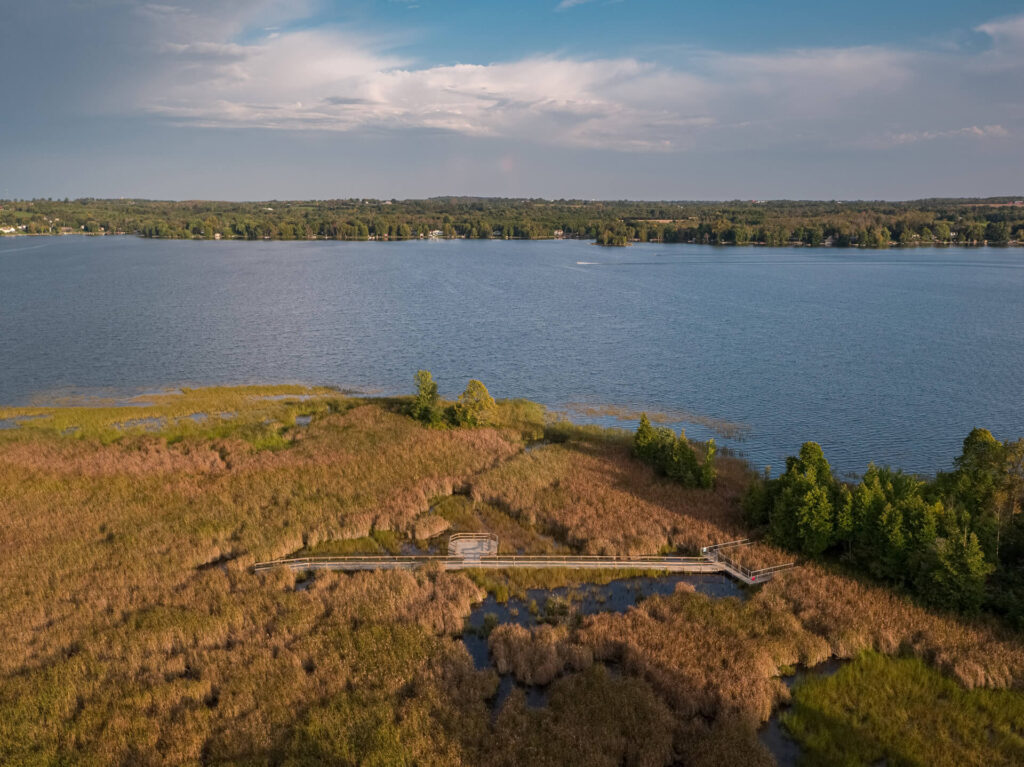As one of the only First Nations owned and operated Cultural Centres in Ontario, the Curve Lake First Nation Cultural Centre is recognized as a rich source of cultural knowledge, connection, information, and guidance. Offering a small museum space, educational workshops and programs, and archival space, the Cultural Centre works to make cultural resurgence and language revitalization a reality in our community. Through maintaining a close relationship with an Elders Advisory Circle, the Cultural Centre ensures that all information and exhibits being shared with the public are done so in an accurate, respectful, and good way. The Cultural Centre is dedicated to ensuring that our traditions, ceremonies, language, and cultural knowledge is passed from one generation of Anishinaabeg to the next, strengthening our community and culture.
Monday to Friday, 9:00am – 4:00pm
Hours may vary, please call the Cultural Centre before visiting at 705-657-2758.
The Economic Development, Employment & Tourism Committee and Department are guided by the mission statement, “to provide for the creation of a prosperous community,” while adhering to the values that ensure all community economic development is socially, culturally, and environmentally appropriate for Curve Lake First Nation.

At the Curve Lake Cultural Centre, we offer a variety of outreach programs and workshops to make cultural knowledge accessible to everyone who is interested in beginning or strengthening their cultural understanding.

In Curve Lake, we speak a dialect of Anishinaabemowin (the Ojibwe language) called Michi Saagiig. Our dialect is recognized as a soft, gentle, and slowly spoken version of Anishinaabemowin that reflects the soft sounds of the water and forest that surrounds and sustains us. Our language is deep, meaningful, and held very close to our hearts. It’s a language that connect us to each other, to the land, to our ancestors, and to our future generations.
Despite colonization and assimilation taking a toll on the number of language-speakers in the community, the Curve Lake Cultural Centre is dedicated to making language revitalization a reality. Anishinaabemowin is taught at our community school, daycare, and early learning centre, along with local public schools outside of community boundaries. To support the continued effort of language resurgence, the Cultural Centre’s Anishinaabemowin Coordinator works with language educators, traditional language speakers and learners, and supports Anishinaabemowin-centered programs such as weekly Language Nights, translation projects, and activities that encourage language-learning in youth.
For more information about Anishinaabemowin, please contact the Anishinaabemowin Coordinator [Courtney contact info? Or link to the staff directory page?]

The Curve Lake Cultural Centre is dedicated to sharing our cultural teachings, values, and histories with everyone who is interested in beginning or strengthening their cultural understanding. At the heart of this sharing, learning, and growing is the goal of nurturing a sense of pride and confidence in our community. We believe this is vital to supporting cultural resurgence, language revitalization, and deepening relationships in the spirit of reconciliation and cultural appreciation. One of the ways we do this is through our Community Outreach Coordinator’s community-based cultural programming designed to strengthen relationships within the community and beyond, always with the goal of reinforcing cultural pride and awareness.
Many of the cultural programming opportunities offered through the Cultural Centre focus on social gatherings, ceremony, and on traditional craftsmanship that is significant to community cultural history and identity. Ensuring that our future generations hold knowledge and skill in certain areas of craft and ceremony is vital to maintaining a strong connection to culture, to ourselves and each other, and to past and future relations.
For more information about cultural programming, please contact the Community Outreach Coordinator [Lionel contact or link to staff page]

Archiving is a practice that is vital to the preservation and management of a community’s records, histories, documents, heritage, and identity. For First Nations, cultural archives are something necessary when it comes to ensuring our future generations will have easy access to cultural information that will assist them on their cultural learning journeys and foster a sense of cultural and community pride in their Anishinaabe identity.
Many First Nations, academics, researchers, and students are looking to connect with our culture, strengthen their understanding of culture and identity, and access historical information that will support them on their cultural learning journeys. The Cultural Centre is home to a collection of artifacts, photographs, documents, and audiovisual material that has been gathered over the course of [20?] years that can assist on those journeys. Through our heritage preservation, we can assist with access to rich cultural information, documenting our history, and passing our culture to the coming generations. We are currently in the process of cataloguing, recording, and digitizing current collections to ensure that this wealth of knowledge and cultural heritage is accessible to our current and future communities.
Anyone with an interest in accessing, learning about, or donating to our archives is encouraged to reach out to the archivist [Anna contact or staff page link]